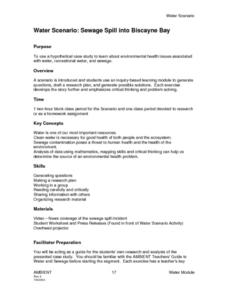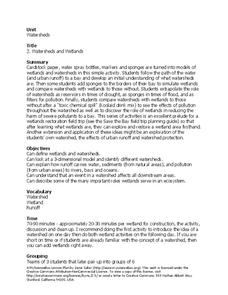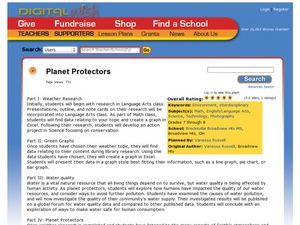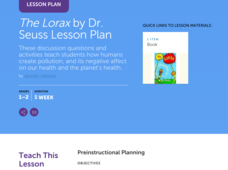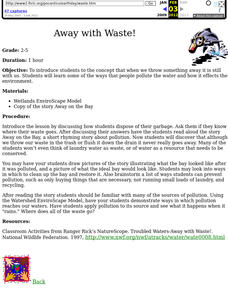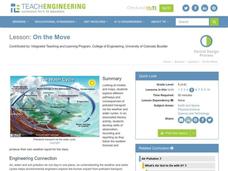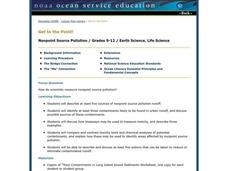Curated OER
"Water, Water Everywhere and None to Drink"
Ninth graders research the importance of maintaining an unpolluted water source in their community. They work together in groups and brainstorm ideas on what they can do to help. They can also write their local politicians.
NOAA
Stressed Out!
Are our oceans really suffering due to the choices humans make? The sixth and final installment in the volume of activities challenges research groups to tackle one of six major topics that impact ocean health. After getting to the...
Curated OER
What's Gotten Into You?
Young scholars use models to investigate the process and consequences of water contamination on the land, groundwater, and plants.
Curated OER
To Protect Your Streams, Protect Your Mountains
Students build and experiment with a watershed to understand the effects of pollution. In this movement of water lesson, students work in groups creating rock formations and change the viscosity of the liquids falling down the mountain....
Curated OER
A Town in Trouble
Students identify and describe the parameters and analytical techniques used to characterize water contamination in a class presentation. They identify the consequences of high contamination levels in the water supply during a class...
Curated OER
Sewage Spill into Biscayne Bay
Students use a hypothetical case study to learn about environmental health issues associated with water, recreational water, and sewage. They use an inquiry-based learning module to generate questions, draft a research plan, and generate...
Curated OER
Watersheds and Wetlands
Students simulate a chemical spill. For this watersheds and wetlands lesson, students build a watershed and observe what happens when it rains. Students add wetlands to their watershed models and examine the effects of water pollution.
Curated OER
Making Change
Students identify different sources of pollution. In this environment lesson students view a video then make a commercial for the town.
Curated OER
Keep the Environment Clean
Students discuss ways our environment becomes polluted. They make a list of ways to keep it clean.
Curated OER
Planet Protectors
Students explore ways to protect the earth. In this environmental issues and technology activity, students investigate the water quality in their community and compare their findings to the water quality in other geographic areas. ...
Curated OER
Settling The Wasterwater Problem
Learners name models that are representations of larger objects. They suggest ways that industry, agriculture, and mining affect water quality. Pupils demonstrate the use of lagoons for treating wastewater. Students define the...
Curated OER
Engineers for a Sustainable World
Students experiment with making a water filtration system. In this engineering lesson, students get into groups and are challenged to use only eight items to create a water filter. When finished, students compare and contrast their results.
Curated OER
Runoff: Intro to Watersheds
Learners are taught that a watershed is, what types of basic land cover are impermeable and permeable to water. They trace the flow of water around their school and around their home. Students determine what watershed their school is a...
Curated OER
How Much Water is in That River?
Students practice measurement using the Hudson River. They calculate the discharge measurement at a location on the Hudson River using ingenuity and a topographic map.
Kenan Fellows
Use of Dichotomous Keys to Identify Stream Organisms
What kind of organisms are living in the stream? After an explanation on how to use a dichotomous key, groups of three to four use the keys to identify macroinvertebrates from a local freshwater stream. Using the the concept of Stream...
Scholastic
The Lorax by Dr. Seuss Lesson Plan
Celebrate the whimsical world of Dr. Seuss with a lesson plan that features the memorable tale of The Lorax. After listening to a riveting read-aloud, scholars take part in a grand conversation about the story and environment. Then they...
Global Oneness Project
Reclaiming Rivers
Robert Hass's article "Rivers and Stories" underscores the importance of rivers in the development of civilization and the importance of reclaiming supposedly dead rivers and implementing policies that protect river health. Groups...
NOAA
Biological Oceanographic Investigations – Keep Away
As of 2015, there are 53,481 oil wells in the Gulf of Mexico. Scholars determine how species diversity is impacted based on the ecosystem's distance from a drilling platform. It focuses on finding the mean of data sets and creating bar...
Curated OER
Away with Waste!
Students read and analyze the story Away on the Bay as a springboard to discuss water pollution. They may look into ways in which water can be cleaned and a watershed restored.
Curated OER
Determination of Overall Water Quality Using a Quantitative Macroinvertebrate Survey
Young scholars examine water samples from a local stream. They identify various types of macroinvertebrates found in that water ecosystem and perform a quantitative macroinvertebrate survey to determine the stream's water quality.
Curated OER
Pollution Solution
Students explore the topic of oil pollution and how it affects the global ocean. They discuss oil spills in recent history and use problem solving skills to decide what strategies could be used to actually clean up an oil spill. Students...
Curated OER
On the Move
Students explore different pathways and consequences of pollutant transport via the weather and water cycles. They observe and record weather information and produce their own weather report for the class.
Curated OER
Moving without Wheels
Learners observe a simple water cycle model to better understand its role in pollutant transport. This activity shows one way in which pollution is affected by the water cycle; it simulates a point source of pollution in a lake and the...
Curated OER
Get to the Point!
Students write out sources of pollution and identify contaminants are most likely found in urban runoff. In this pollution lesson students compare toxicity tests and chemical analysis of potential contaminants.
Other popular searches
- Water Pollution Worksheets
- Water Pollution Experiments
- Air and Water Pollution
- Sources of Water Pollution
- Air Water Pollution
- Water Pollution Lesson Plans
- Water Pollution Activity
- Bacterial Water Pollution
- Water Pollution Works
- Water Pollution Lesson
- Water Pollution Oil Spills
- Types of Water Contamination







